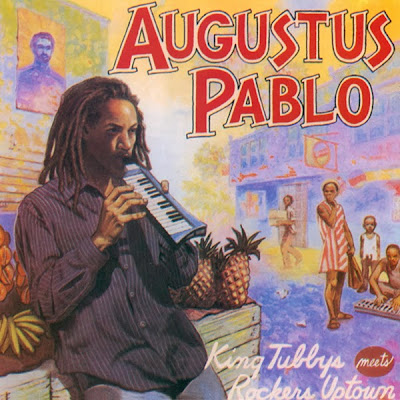 |
| King Tubby |
What struck me over and over again as I listened to the LP this week was just how well-crafted this record is and how well it works on multiple listening "levels". On the one hand, 'King Tubby Meets Rockers Uptown' is a perfect album to throw on your choice of player, kick back, and just let the music and sounds wash over you. But alternatively, it's also a record that really rewards active listening with subtle production effects and sounds that you may not catch otherwise; like when you discover the weird, scraping-echoey-something on Skanking Dub is actually an extremely muffled, delayed, and distorted guitar strum. This only adds to the depth and re-playability of the album for me. The record is a totally immersive experience from the first bass thump and drum kick of the opening track, Keep On Dubbing, to the expansive closer Satta Dub; and at 31 brief minutes the record never overstays its welcome. As vocals echo and melodica melodies fade in and out and hazy rhythms are built, Pablo and Tubby display track after track the transportive power of music to really put the listener in another mindset. Truly awesome stuff.
As with all records after multiple listens, favorites begin to form in my mind as well as tracks which don't quite gel with me. 'King Tubby Meets...' is a record with very few flaws and the flaws that I find are mainly that of my own personal preference. Tracks like 555 Street Dub and Brace's Tower Dub No. 2 are wonderful in and of themselves but when held up to the high standards that surround them, I feel like Augustus Pablo and King Tubby could have pushed the production just a bit more and given them that extra edge. They just seem a little plain or even tame when compared to the out-there dub stylings of the stand-outs on the LP and they keep 'King Tubby Meets...' from being a truly perfect record in my eyes.
In a record full of stand outs, a couple tracks stand head and shoulders above the rest for me. The first being Each One Dub, which is one of the few tracks of the record to incorporate vocals into its production. But here they are used as merely another effect, another coat of hazy paint on Pablo's and Tubby's dub tapestry. My favorite moment on the whole record comes when the vocals, in one of the few intelligible lines, sing, "Tomorrow might not be the same-say-say-say-say-say" and that last half of the word "same is drawn out and reverb-ed into the stratosphere. Oooh, its great. The title track, King Tubby Meets Rockers Uptown, is probably the best overall track on the record and probably the first place I would point someone interested in hearing first-hand what dub music is. It's an education all unto itself.
So if reggae is new territory to you, first, go out and purchase Bob Marley's 'Legend' and once you have worn that out, you could find few better albums to follow it up with than 'King Tubby Meets Rockers Uptown'. Putting this record on and just letting my mind wander and relax has been an absolute joy and pleasure and I can only hope that a few of you will go out and seek the wonders that Augustus Pablo and King Tubby have brewed up for you. A truly, truly enchanting and out-of-this-world album that deserves its place in dub and reggae history along with a place on every music lover's shelf.
The Breakdown:
Stand-Outs: King Tubby Meets Rockers Uptown, Each One Dub, Satta Dub
Let-Downs (but not really): 555 Street Dub, Brace's Tower Dub No. 2
Rating: 9.5/10
Up Next: We are heading into the present day this week with a 2013 release that I have been hearing nothing but positive buzz about: Chvrches (pronounced 'churches') debut album 'The Bones of What You Believe.' Time for some synthpop goodness!


Thanks for choosing this one, sir. That was lovely. Irie even, one might say. That first sentence alone is worth the price admission and I can't fault a single word of this review. Well played.
ReplyDeleteI sometimes say and still believe that reggae music is virtually the only music I could never tire of listening to non-stop, around the clock, and long after other genres would grate on me, and this is because as your review points out there are so many different facets and styles to it.
And oh for the days when artists and albums were economical. Three-quarters of an hour to half an hour always seems about right and just a perfect listening length of time to me.
Thanks again. Keep up the good work.
Thanks, as always, for the comments, T. I agree that I don't think that I would ever tire of reggae; its a gift that just keeps on a-giving!
Delete